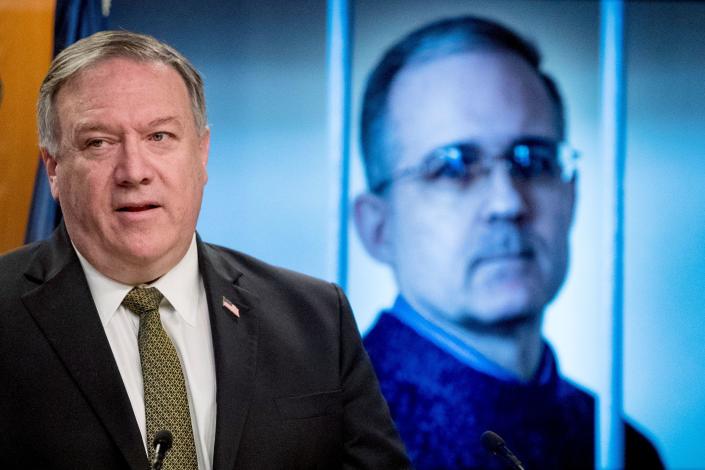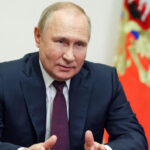The prisoner exchange that saw WNBA star Brittney Griner released, while Russia got notorious arms dealer Viktor Bout, has been widely lauded by Russian state media and Kremlin loyalists as a win for Moscow — and a sign of weakness on the part of the U.S.
“I have to say that we have achieved a tremendous victory today. I don’t even think we have the full understanding of how big it is,” Russia’s top propagandist Vladimir Soloviev said in his daily television show. “The Russian intelligence agencies, alongside the Foreign Ministry, have carried out a stunning operation and brought home a man who did not plead guilty once, who was wrongly convicted and slandered but did not betray his homeland.”
While securing Griner’s freedom may have scored points for President Joe Biden at home, the same goes for Russian leader Vladimir Putin with the release of Bout. Over the 14 years Bout spent in a U.S. prison, he became something of a martyr figure in Russia. Bringing a patriot home is also a public win at a time when Putin declares Russia to be in an existential battle against American “hegemony” and its “alien values.”


Bout’s very first public interview after his release was with Russia’s RT network, which is run by one of the most fervent supporters of the war in Ukraine, Margarita Simonyan. He was interviewed by Maria Butina, who pleaded guilty to conspiring to act as a clandestine foreign agent in the U.S. and spent 18 months behind bars before being deported back to Russia. Back home, she quickly became the poster child for Russia’s existential battle with the West, got a seat in the Russian parliament and her own show on RT.
One of the first questions Butina asked Bout was whether he believed the exchange was “a sign of the weakness of the United States that just caved in” to Russia, echoing John Bolton, former national security adviser in the Trump administration, who said the swap was as “an American surrender.”
“I would not draw such conclusions. American politics is always at the childish level of boys in the yard who label people as weak,” Bout responded. “In fact, I am sure that neither our leadership, nor those who make decisions in our country, think in such categories, whether you are weak or not weak.”
“I think if the deal took place, it means that some points of contact were found that could satisfy the two parties; otherwise, this deal would not have happened,” Bout added.
Simonyan, the head of the network, alleged that the U.S. initially wanted to swap Bout for Paul Whelan but then ended up “choosing” Griner, and described one of the most celebrated basketball players of her time in disparaging terms.
“They wanted to exchange Booth for Whelan, but they exchanged for Griner,” Simonyan wrote in her Telegram blog on Thursday. “Because between a hero spy, a decorated Marine who suffered for service to the Fatherland, and a drug-addicted black lesbian who suffered for vaping hashish, the modern American voter chooses the obvious.”
U.S. officials have dismissed the narrative that Washington was given a choice in negotiations where they sought the release of both Griner and Whelan, a U.S. Marine veteran imprisoned in Russia on espionage charges, as Russia made it clear it would be Griner or no one.
Ambassador John Sullivan, who stepped down as the top U.S. diplomat in Moscow in September, said on “CBS Mornings” that the talks to free Griner were “extremely difficult negotiations,” with the Russians focused only on Griner in exchange for Bout.
“We’re dealing with a government that isn’t bound by law or morals, our counterparty. It’s not a typical diplomatic negotiation. And my understanding is that the Russians really presented the president, President Biden, with a take-it-or-leave it proposition. One for one, it was Brittney,” Sullivan said, citing conversations with current and former officials. “And unfortunately, we’ve had to leave other Americans, in particular, Paul Whelan.”


Soon after news of the swap broke, Russian state media pundits began praising President Vladimir Putin “for not abandoning our own,” a motto that has been appropriated by war supporters who use it to support the Kremlin’s claims that Russia is “rescuing’ the Russian-speaking population in Ukraine from what they call the “Nazi regime” in Kyiv.
“Some people think the motto too pretentious. But it doesn’t matter, as these are not empty words, but the working formula for the existence of the Russian state and the essence of the Russian world,” wrote a popular Telegram commentator who writes under the monicker Kremlevskaya Prachka.
The post added that Russia will fight for “every Russian who languishes in American, Ukrainian, French dungeons” as long as they commit to “being Russia” and doesn’t “go against the Motherland.”
Whelan’s lawyers said that “secret negotiations” on his potential swap are still ongoing, spurring speculation in Russian media about whom Moscow may seek to exchange next. Over the summer, U.S. news outlets reported that as a condition for the two-for-two swap involving Griner and Whelan, Moscow demanded the release of Vadim Krasnikov, a convicted assassin who murdered a former Chechen fighter, Zelimkhan “Tornike” Khangoshvili, in a Berlin park, who is in German custody. Russian officials have also signaled they are interested in freeing people convicted of cybercrimes in the U.S.
Protecting America’s electric grid from attack | 60 Minutes Archive
18-year-old Jaylen Smith makes history as mayor-elect of Earle, Arkansas
NASA’s Artemis 1 mission to splashdown Sunday after trip around the moon




